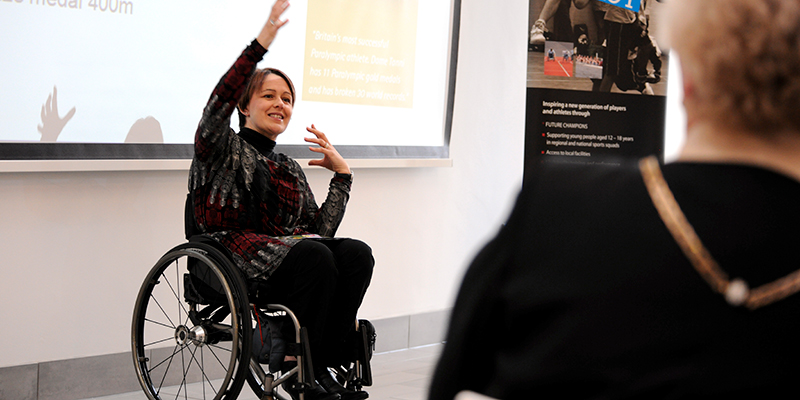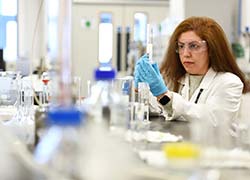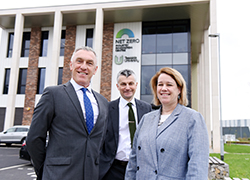Researchers aiming to find out why disabled children are being left behind when it comes to sport
Leading figures in disability sport and education are backing research at Teesside University which is aiming to break down the barriers for disabled people to participate in physical activity.

Academics say there has been a continuous trend of broken promises and inactivity since the 2012 Paralympics in London, which was supposed to be a springboard to improve the daily lives of disabled people and provide increased opportunities to participate in sport.
But, instead of a new lease of life for disabled children, Tom Gibbons and Stuart Braye of Teesside University argue that disabled youngsters are still treated as outsiders and are not being given the opportunities to take part in sport while at school.
They cite training, attitudes, facilities and funding as the reasons disabled children are being left behind when it comes to physical activity in education.
Their research is shining the spotlight on initial teacher training (ITT) and whether PE teachers across the country feel adequately trained to include disabled children in lessons.
Baroness Tanni Grey-Thompson, Britain’s most decorated ever Paralympian and an Honorary Graduate of Teesside University, is backing the research and hopes it will make a difference to the lives of young disabled people.
She said: 'Physical activity is an incredibly important component of a young person’s development, and this is equally true for disabled children. It is crucial that there is quality access for disabled children and there is a need for more direct data to understand their experience to be able to provide the correct resources. 'Many disabled people are unsure about what physical activity to do and more information about what happens at school level will be able to establish good practice.'
Both Tom and Stuart are initially asking PE teachers to complete a short online survey and are then following up the results with more in-depth interviews. The overall aim is to come up with an intervention in ITT which will give PE teachers more confidence to include disabled children and also allow disabled people to become PE teachers themselves, something the pair say isn’t happening in mainstream schools.
Stuart, a Senior Lecturer in Sport and Exercise, became a disabled person in 1985 at the age of 26. He went on to compete in the 1992 Paralympics in Barcelona, securing a bronze medal in the 400 metres.
'The 2012 Paralympics were supposed to kick-start a revolution for disabled people, but we are yet to witness any significant changes,' explained Stuart.
There shouldn’t be any reasons that disabled children in mainstream schools are not given the same opportunities as everybody else.
'PE is where most children experience their first taste of sport and are either turned on or turned off. But disabled children are missing out as they are not getting the opportunities to even participate. The general feeling among PE teachers is that they don’t feel suitably trained to include disabled children in their sessions.
'This can have a significant negative impact on disabled children – not just in terms of their physical and mental development, but it also communicates, at an early age, to non-disabled children that it is okay to exclude disabled people.'
The Research, which also includes Teesside University academics Dr Kevin Dixon and Alison Innerd, as well and Tees Valley Sport, is funded through the University’s Grand Challenge Research theme of Resilient and Secure Societies.
Tom Gibbons, also a Senior Lecturer in Sport and Exercise, has a six-year-old son who is disabled and he is committed to ensuring that all young people are given opportunities to participate in sport.
He said: 'This research is important because it is addressing the fundamental issue in terms of whether PE teachers feel adequately trained and supported to include disabled children in their activities. And, if they don’t, what can be done to change this?
'There shouldn’t be any reasons that disabled children in mainstream schools are not given the same opportunities as everybody else.'
Another former Paralympic Gold medallist, Tara Flood, is the CEO of The Alliance for Inclusive Education.
She said: 'For far too long now schools have found spurious and discriminatory reasons to exclude disabled pupils and students from PE sessions. PE is an important element of an inclusive curriculum so teachers need support and training to have the skills to deliver PE sessions that are inclusive of all pupils and students whatever their participation and learning difference or style.'
Stuart and Tom are urging as many PE teachers as possible to complete the short online survey in order to paint a clear picture and draw up actions for change.
 Supporting Nigerian farmers by transforming food waste into
...
Supporting Nigerian farmers by transforming food waste into
... International partnership signed with prestigious American
...
International partnership signed with prestigious American
... Teesside University academics join prestigious network of
...
Teesside University academics join prestigious network of
...